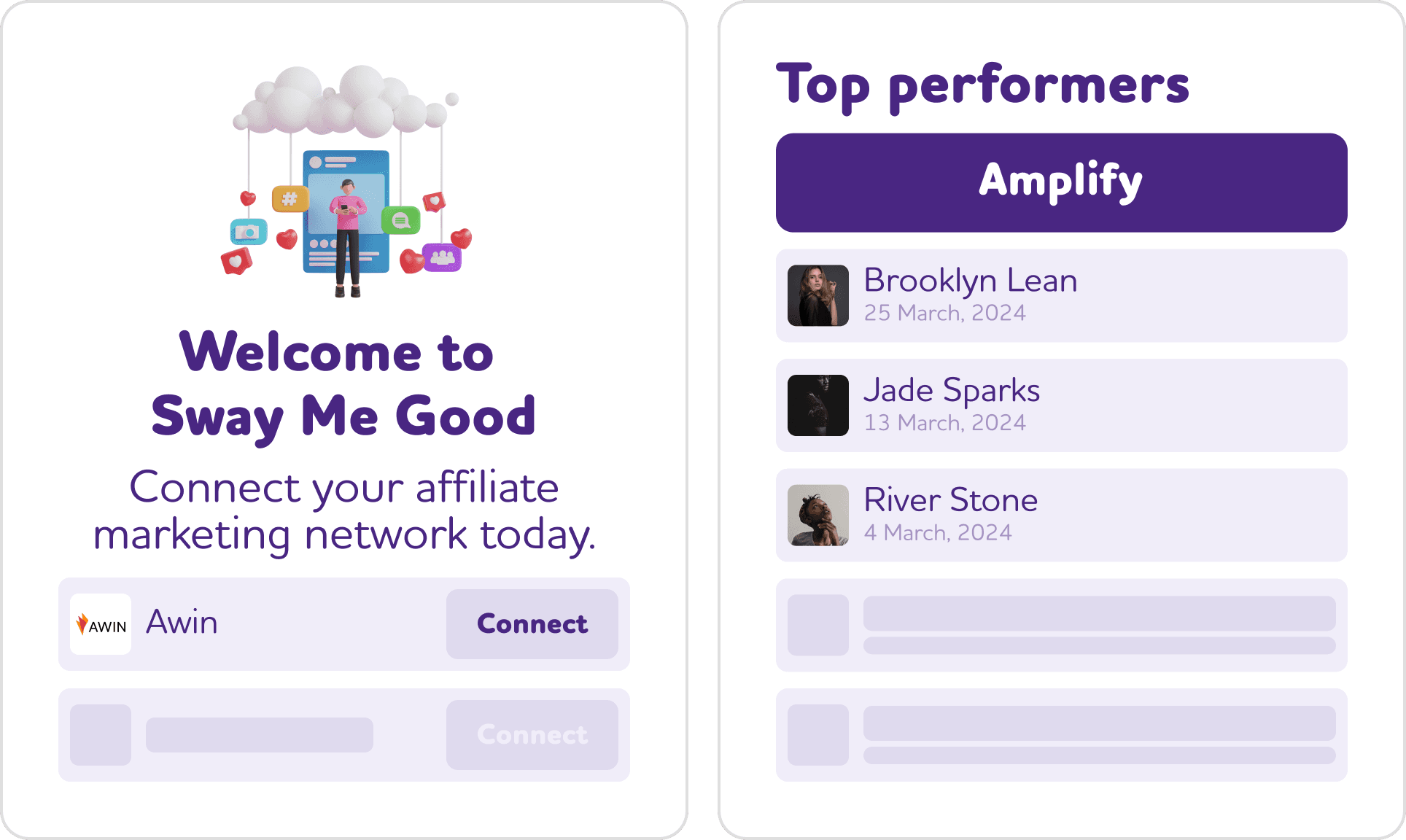06 January, 2025
Data is king when it comes to running targeted influencer marketing, but with big data comes big responsibility. The collection, storage and processing of data brings legal responsibilities to protect privacy.
Whether you are a seasoned marketer or new to influencer partnerships, this guide will equip you with the knowledge and tools needed to navigate data protection challenges effectively.
Adhering to these guidelines, advertisers can ensure that their influencer marketing campaigns are not only effective but also compliant with relevant data regulations such as the General Data Protection Regulation (GDPR) and the California Consumer Privacy Act (CCPA). This proactive approach safeguards the interests of consumers and enhances the credibility and trustworthiness of both the brand and the influencers with whom they collaborate.
If you need more confidence in managing influencer data or want to significantly reduce the workload so that you can scale, influencer marketing platforms like Sway Me Good can help keep your campaigns data compliant.
Types of Data Involved
Understanding the types of data involved is crucial for managing data protection responsibilities adequately. Here, we break down the types of data commonly involved:
Personal Data
Personal data refers to any information that can be used to identify an individual. In the context of influencer marketing, this often includes:
Names; both influencer and audience names may be collected.
Contact information; email addresses, phone numbers, and social media handles are often gathered for communication purposes.
Demographics; age, gender, location, and other demographic details help tailor marketing strategies and understand audience segments.
Photographs and Videos; content created by influencers, which often includes their likeness and personal identifiers.
Social Media Profiles; data from profiles such as followers, engagement rates, and content preferences.
Pro Tip: Certain demographic data is regarded in some jurisdictions as Special Category Data, which requires influencers to actively agree for you to store and process. This includes, but is not limited to, religion, ethnicity, sexual orientation, etc.
Financial Data
Financial data is also critical, mainly when influencers are compensated for their work. This type of data includes:
Payment Information such as bank account details, PayPal accounts, or other payment methods used to compensate influencers.
Transaction Records like documentation of payments made to influencers, including amounts and dates.
Tax Information including tax identification numbers and related documents are necessary for legal and financial reporting.
Understanding these different data types is essential for advertisers to effectively manage their data protection obligations. Each data category has unique storage, processing, and protection requirements, necessitating a comprehensive approach to data management.
Purpose of Data Collection
It is really important that advertisers are clear about why they are collecting and storing data, these are some of the reasons you might be doing so.
Marketing Analysis
Audience Segmentation: Identifying and categorising different audience groups based on various parameters such as age, gender, location, and interests enables advertisers to tailor content and effectively target the right segments.
Content Optimisation: Understanding which types of content resonate most with the audience. Data on engagement rates, likes, shares, and comments can help refine content strategies to boost campaign performance.
Trend Identification: Staying abreast of emerging trends and shifts in consumer behaviour allows advertisers to adapt quickly and stay relevant in a fast-paced digital landscape.
Performance Tracking
Campaign Metrics: Monitoring key performance indicators (KPIs) such as reach, impressions, engagement rates, click-through rates, and conversions. These metrics quantitatively measure an influencer's impact and the campaign's overall effectiveness.
Return on Investment (ROI): Calculating the financial returns generated from influencer marketing efforts. By comparing the cost of the campaign with the revenue generated, advertisers can assess the ROI and make informed decisions about future investments.
Attribution Analysis: Understanding the contribution of different influencers and channels to a campaign's overall success helps allocate resources efficiently and optimise future strategies.
Compliance and Legal Requirements
Consent Management: Ensure that data collection practices are transparent and that influencers and their audiences have informed consent. This includes clear communication about what data is being collected and how it will be used.
Data Minimization: Collecting only the data necessary for the intended purposes. This principle helps reduce the risk of data breaches and ensures compliance with legal standards.
Documentation and Reporting: Keeping detailed records of data collection processes and maintaining accountability. This is crucial for audits and regulatory inspections to demonstrate compliance with legal requirements.
Data Storage and Processing
Data Storage
When advertisers collect data from their influencer marketing campaigns, they often store this information on internal servers or databases. Internal data storage allows advertisers to control the data directly, ensuring it is kept within the company's IT infrastructure. However, this method also requires robust security protocols to prevent unauthorised access and data breaches. Advertisers should implement encryption, firewalls, and regular security audits to safeguard the data. Additionally, access to sensitive data should be restricted to authorised personnel only, following the principle of least privilege.
Data Security Measures
Whether data is stored internally or with a third-party processor, robust data security measures are essential to protect sensitive information. Advertisers should implement a multi-layered security strategy that includes the following components:
Encryption: Encrypting data at rest and in transit ensures that the data remains unreadable and unusable even if unauthorised access occurs.
Access Controls: Implementing strict access controls, such as multi-factor authentication and role-based access, helps ensure that only authorised individuals can access sensitive data.
Regular Audits and Monitoring: Regular security audits and continuous monitoring can help identify and address potential vulnerabilities before they are exploited.
Incident Response Plan: A well-defined incident response plan allows advertisers to quickly and effectively respond to data breaches or security incidents, minimising potential damage.
Employee Training: Educating employees about data protection best practices and the importance of security measures can help prevent human errors that could lead to data breaches.
Data Retention Period
The data retention period is when collected data is stored before it is deleted or anonymised. This period must be carefully determined and managed to comply with data protection regulations and ensure that data is only retained for as long as necessary to fulfil its intended purpose.
Business Needs and Purposes
The retention period should be aligned with the business needs and purposes for collecting data. Advertisers must assess how long they retain data to derive meaningful insights or fulfil legal obligations for marketing analysis, performance tracking, and compliance purposes. For instance, data used for performance tracking might be retained for shorter periods than data needed for compliance with tax regulations, which may require longer retention periods.
Data Minimization Principle
A fundamental principle in data protection is data minimisation which entails collecting only the data necessary for a specific purpose and retaining it no longer than necessary. Advertisers should implement policies and procedures to regularly review and purge data that no longer needs to be purged. This helps comp comply with regulations, reduces the risk of data breaches, and enhances overall data management efficiency.
Establishing Clear Retention Policies
Advertisers should establish clear retention policies that outline the specific retention periods for different data types to effectively manage data retention. These policies should be documented and communicated to all relevant stakeholders, including influencers, data processors, and internal teams. Automating data deletion or anonymisation processes can also help ensure compliance with retention policies.
Monitoring and Auditing
Regularly monitoring and auditing data retention practices are essential to ensure retention policies are followed and remain effective. Advertisers should conduct periodic audits to verify that data is being deleted or anonymised as per the established retention schedules. This proactive approach can help identify and address discrepancies or lapses in data retention practices.
Transparency with Influencers and Consumers
Transparency is critical to building trust with both influencers and consumers. Advertisers should clearly communicate their data retention policies, including how long data will be retained and the reasons for its retention. Providing this information in privacy notices and agreements helps ensure all parties know and consent to the data retention practices.
Is the Data Being Sold?
Whether data is being sold carries significant ethical and legal implications. Advertisers working with influencers must navigate this terrain carefully to maintain trust and comply with stringent data protection laws to remain GDPR and CCPA compliant.
Both GDPR and CCPA have specific stipulations regarding the sale of personal data. Under GDPR, selling data without explicit consent can lead to severe penalties, including fines of up to 4% of the company's global annual turnover. Similarly, CCPA grants California residents the right to opt out of the sale of their personal data. Failing to adhere to these regulations could result in legal repercussions and damage your brand’s reputation.
If you want to start in influencer marketing or are seeking to improve and standardise your campaign processes, Sway Me Good can help you scale up, increase efficiencies, and remain compliant. Our platform is built to deliver the right way, so you don’t have to worry as much about the legal intricacies.
You can explore our features and solutions for influencer marketing here or book a demo here.
This article is for reference purposes only. It does not constitute legal advice and should not be relied upon as such. Specific legal advice about your specific circumstances should always be sought from a legal counsel separately.

New
20 min
The Art of Valuing Influencers
Support for various content types such as articles, blogs, videos, and more. Rich text editor with formatting options for enhanced.

Gad
May 14, 2024

New
20 min
The 20 Best Influencer Marketing Agencies in the UK (2024)
Support for various content types such as articles, blogs, videos, and more. Rich text editor with formatting options for enhanced.

Gad
7 April, 2024

New
20 min
Top 7 Strategies to Scale Influencer Marketing in Agencies
Support for various content types such as articles, blogs, videos, and more. Rich text editor with formatting options for enhanced.

Gad
30 July, 2024





